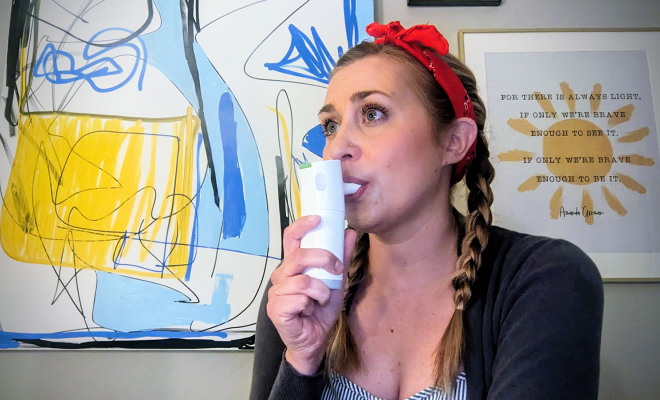“How are you feeling?”
It’s a question we as individuals living with CF have heard more than we can begin to count. Not only is it the first question we will hear at any given appointment, it’s also a question that plays on repeat in our minds. As a silent response, we constantly are scanning, analyzing — maybe overthinking a bit — deducing, or ignoring the outcomes like bad background music that we’ve come to know as we wait on “hold.” That question has an immovable spot among our weekly Top 40 but, it is a song we’ve never requested let alone wanted to have stuck in our heads.
As individuals who are a part of the cystic fibrosis community, we are no stranger to the world of medical jargon, being the subject of our very own biology, chemistry, and anatomy lessons, or having to live life focused on probable and hopeful outcomes. We have become accustomed to being a “team player” and are grateful for the necessary and ever-growing interdisciplinary approach that the vast complexities of having CF demand. This, however, also means there’s a chorus of the well-meaning and necessary question, “How are you feeling?” covering every medical genre. With the complexities that accompany CF, we unconsciously prioritize various areas of our health while having to make concessions, for good reason, toward other areas of our well-being.
But what would happen if I asked you, “How does your voice feel today?” What would you say? Maybe it’s something you've never been asked before, especially when it comes to your life with CF. Maybe you’ve taken note of your voice and how it feels but never thought it worth discussing with anyone. It is an important question — one that can uncover and connect every part of your overall well-being and health.
Our voice is a pivotal element in our health. A person living with CF has so many varying circumstances that can affect the voice. Not to mention, CF’s progressive nature in relation to vocal hygiene is a lifelong issue. With a commitment to our voice and its health, we can utilize this natural and unique mechanism to help combat and control the effects of our disease. Again, you may have never thought just how much your own unique voice has to tell you. Here are a few scenarios that may resonate, along with their importance to your health:
Scenario #1
It’s a usual morning and you attempt to speak but nothing comes out. You try again with more force and effort only to feel a familiar hoarseness and gravelly strain. It’s happening again. You’re losing — or have lost — your voice. It’s a familiar frustration that you’ve resigned yourself to believing is just something that happens to you frequently. You explain away your self-consciousness to others with, “I just lose my voice a lot” or give the response, “I must be getting a cold.”
What is your voice or lack thereof telling you? Here are a few questions to ask yourself:
MEDS: What nebulized or inhaled medications are you currently taking? Are you currently doing a cycle of TOBI®? If so, have you lost your voice previously during a course of TOBI? Nebulizing any medications, especially nebulized antibiotics like TOBI, or inhaling steroids can be incredibly irritating to the delicate makeup of your vocal folds and vocal mechanism.
Helpful tip: We are not going to stop inhaling these life-saving medications and therapies, but we can help combat their effects on the voice with a little proactive action. When you’re done doing ANY nebulized medication or inhaled steroid rinse and gargle with salt water or the same solution used to rinse sinuses. This helps to "clear away" irritants left behind by particulates from inhaled medications.
COUGH: Have you been coughing more? Are you experiencing postnasal drip? Silent reflux? The early signs of an exacerbation? Whatever the cause, coughing can irritate our vocal folds and cause swelling — a defensive reaction to help protect our voice from extensive harm that can result in voice loss, hoarseness, and pain. This is one of the body’s natural defenses to protect your voice from irreparable damage.
Helpful tip: Acid reflux (or GERD) can be detrimental to your vocal health and, if undiagnosed or untreated, can cause lung complications due to aspiration. Talk to your CF care team as not all GERD looks or acts the same. Voice loss or hoarseness can be a helpful component to diagnosis and treatment. Postnasal drip tip: Nightly and morning sinus rinses are your best friend.
INFECTION & INFLAMMATION: How do your lungs feel? Is your chest or throat feeling tight? Sore? Active infections or bacterial/ fungal overgrowth not only can compromise lung function and one's ability to adequately take in a deep breath, but it can negatively impact the vocal folds and the throat causing voice loss, hoarseness, and vocal damage.
Helpful tip: Listen to and trust your body and your voice. Connect with your CF care team about the signs of an exacerbation or chronic inflammation.
Scenario #2
It’s PFT time. You have butterflies in your stomach and thoughts racing through your head. No matter how many years you have been doing these, your nerves still take center stage. Your seasoned respiratory therapist calls out your name and she greets you with her usual encouraging excited smile. You feel your voice catch and crack as you try to meet her with the same enthusiasm. You clear your throat and try again but your strident voice feels heavy and untrustworthy. You make your way to the PFT lab where you sit anxiously, nose clip on, lips wrapped securely around the mouthpiece — listening to your favorite RT coach you through something so seemingly simple as “normal breaths,” “deep breath,” and “BLOW!” An inner dialogue is running rampant as you question if you’ve ever taken a breath in your life along with the uncertainty of what the numbers are going to say and what they are going to mean. You have never felt more uncoordinated and any less sure in your life. Then, repeat.
THE ART OF BREATHING. Your breath is the vehicle by which your voice sets sail. How your voice feels and sounds can give direct insight into how you’re using your breath. Are you holding your breath and, therefore, not engaging your diaphragm, which directly influences deep breathing? Are your intercostal muscles tight and rigid? Are your airway and throat tense? All these components directly impact the quality, consistency, and condition of our voice, not to mention our stamina, strength, and steadiness. This insight not only helps you navigate the unavoidable PFT but can help you achieve your best breath potential every day.
Helpful tip: Engaging in breath exercises and breath awareness practices allows you to approach a PFT from a controlled and mechanical technique rather than as an emotionally based response. It allows the potential results to be a clear reflection of your lungs, rather than based on a feeling of luck.
As individuals living with CF, it can feel like much of our life is left to the control of an uncertain and unfair disease. What if you could regain some of that control in how you combat the effects of this disease just by listening to your voice? How might your life with CF change if you added a new track to your playlist and asked the question, “how does my voice feel today?”
Interested in sharing your story? The CF Community Blog wants to hear from you.





